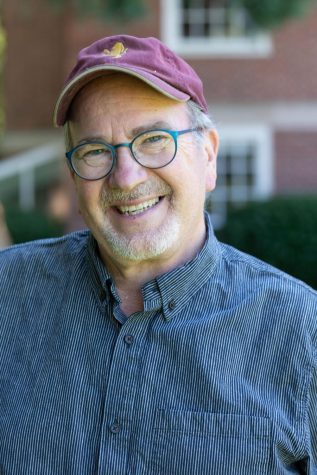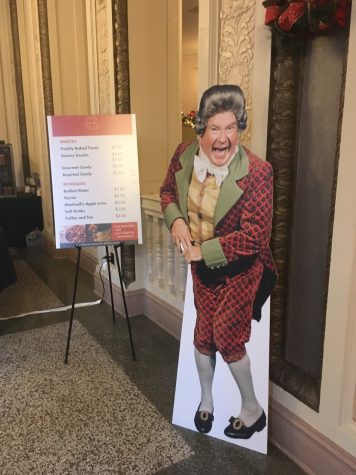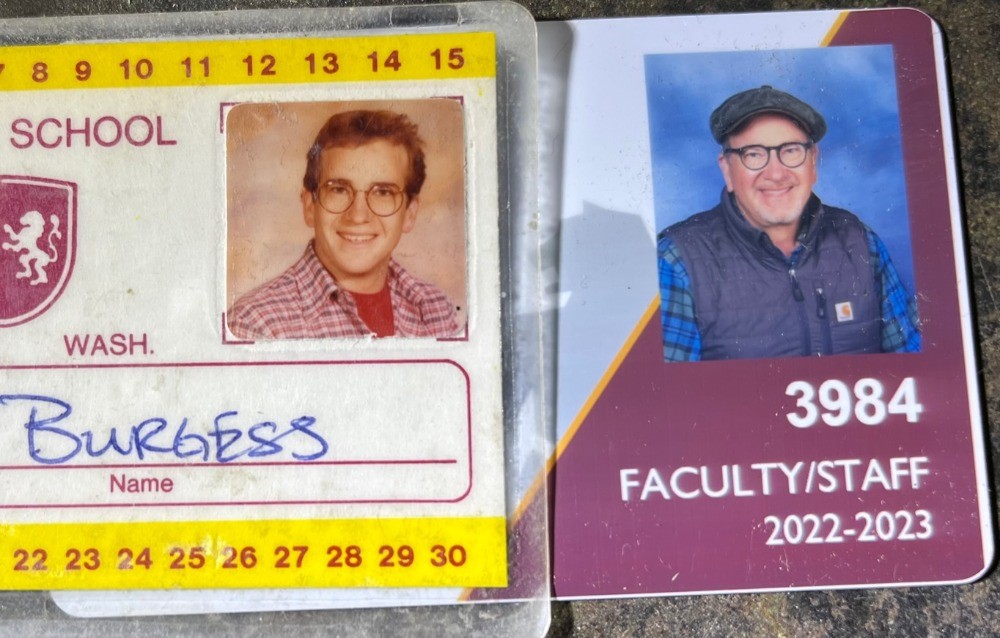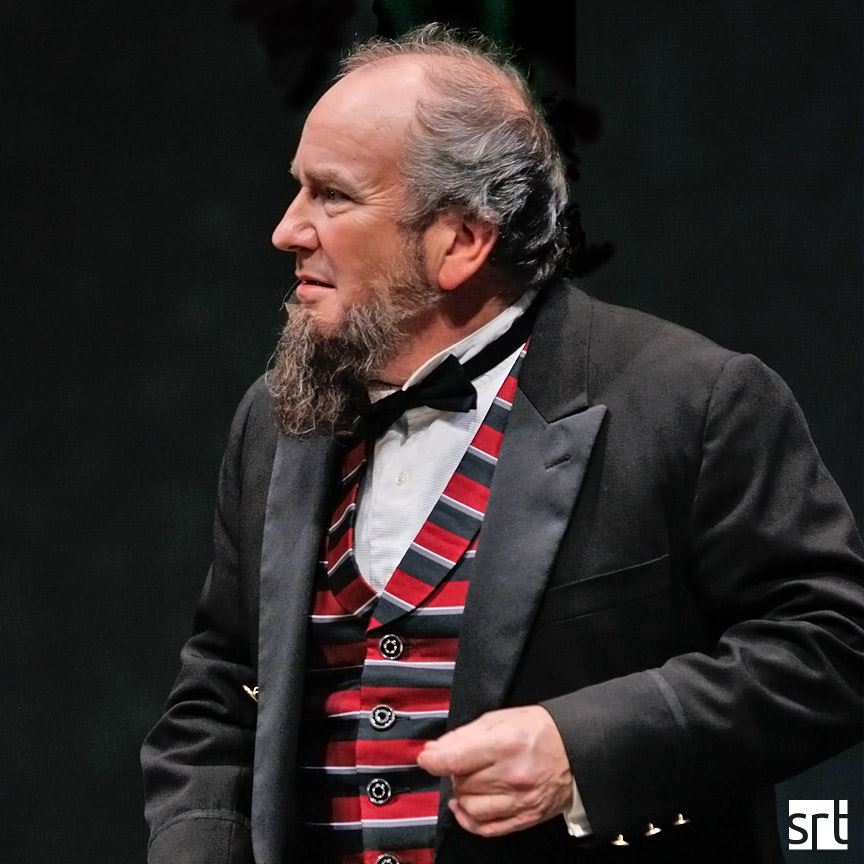Rob Burgess, Maintenance Foreman and the Real-Life Mr. Fezziwig
When A Contemporary Theatre (ACT)’s rendition of “A Christmas Carol” begins, no curtains are drawn. The play takes place in a round theater, expertly designed so that actors can run up and down the aisles and directly address the audience at every turn — creating a vibrant and engrossing experience like none other.
As the Ghost of Christmas Past conjures up yet another nostalgic Christmas memory for Scrooge to bear witness to, we are greeted with the joyous Mr. Fezziwig, whose infectious cheer immediately draws delighted laughter from the audience. As it so happens, the actor portraying Mr. Fezziwig is Lakeside’s very own maintenance foreman, Rob Burgess.
On any given day, Mr. Burgess starts his day at Lakeside at six o’clock in the morning and begins to unlock most of the campus, turning on the lights as he goes. From there on, he sets about attending to a myriad of little fires which continue to arise throughout the day: a leaking pipe, a broken toilet, or even a last-minute request for a minibus training.
Recently, I sat down with Mr. Burgess to discuss his history with Lakeside as well as his experiences as an actor. As Mr. Burgess spoke, it was evident just how much he cherishes this campus. In fact, when I asked him what his favorite place in Lakeside was, it was difficult for him to narrow it down to a single one. There were, of course, the secret places available only to the maintenance department, such as Bliss Hall’s bell tower or the attic of McKay Chapel. Then there was his home, located on campus, as well as the theater — both filled with fond memories.

Ultimately, Mr. Burgess decided that his favorite place on campus would have to be the Quad, describing it as “a beautiful space that frames so many daily social interactions and major community events.” He highlighted the fact that the Quad is freshly mowed on a regular basis, in comparison to the football field, which is apparently dirtier than one might expect.
Throughout his 44 years at Lakeside, Mr. Burgess has become incredibly familiar not only with the campus but with the spirit and community of the school as a whole. In fact, when the school formed a committee to work on revamping its mission statement, it was Mr. Burgess who suggested that they focus not only on mind and body but on spirit as well. Day-to-day ethics, he argued, even little things like picking up lunch trays, were undeniably important and should be given the same consideration.
Equally intriguing is Mr. Burgess’s involvement with Lakeside’s theater programs. While studying first at the American Academy of Dramatic Arts and then at Cornish College of the Arts, he briefly worked a summer job for Lakeside’s maintenance team. When Ronald Reagan was elected in 1980, he moved to a more permanent arrangement with the school, due to the fact that the National Endowment for the Arts was cut by 50 percent shortly thereafter.
At first, he continued to pursue his acting career while working at Lakeside. However, around the time when he and his partner, Melanie, decided to start a family (conjunctly placing his acting on hold), Lakeside asked him to direct a play. Mr. Burgess felt initially apprehensive about the offer, but Melanie assured him: “Rob. You can direct a play.” He thus began a 24-year period of directing.
As a director, Mr. Burgess highlighted the importance of continually trying and trying again, seeking to promote students’ self-discovery by creating an environment that would support their creative spirits. Reflecting on his directing work, he says, “I’m grateful for all of that. A lot of great artists came out of those years that I’m proud to have known.”

In the spring of 2008, just as Mr. Burgess’s youngest daughter was graduating from Lakeside, the Children’s Theater called to see if he was still interested in acting. As he recalls the memory, he credits Director of Facilities Mr. Dawkins with encouraging him to audition for what he refers to as the second part of his career. Although he continued to direct for a few years after that, he stopped around 2012 to focus on acting.
This year’s production of “A Christmas Carol” marks Mr. Burgess’s first return to the stage since before the pandemic. Although he remembers initially questioning whether he would have the energy to do the play, he described the transition back into acting as “just like riding a bike.”
When rehearsals began once again for Mr. Burgess, he discovered that he derived energy from interacting with the audience and his fellow cast members. As he returned for his eighth rendition of “A Christmas Carol” with ACT, he described the production as “unlike any other play you’ll ever do,” highlighting the importance of direct connection with the audience.
At the beginning of each show, Mr. Burgess makes a point to arrive at the space early. From there on, his station becomes a sort of “apothecary” for the rest of the cast, the place where all the other actors go whenever they find themselves in need for tea, vitamins, candy, or simply the reassurance of a good-luck charm (such as smoky quartz or a copper ball). To Mr. Burgess, the social aspect of theater is incredibly important– a trait clearly reflected in “A Christmas Carol,” where every actor in the performance interacts seamlessly and energetically with one another.
Ending with a final word of advice for any burgeoning actors, Mr. Burgess explained that art is, to him, like a mountain. Some find paths which go directly up the face of the mountain, with specific goals and techniques that they stick to throughout. Though that works for some people, Mr. Burgess is a personal proponent of the spiral path — experiencing and experimenting with lots of different things on his theatrical journey. According to Mr. Burgess, there is no definitive top of the mountain. “It’s great to have a goal,” he explains, “but there is no top to art.”
Furthermore, he explained, there is a point for every actor where they’ll feel as though they are a fraud. For him, it’s week three of every four-week rehearsal period. In those moments, Mr. Burgess stresses the importance of attaining a certain degree of confidence with the material where one can reliably act within their role even if things go wrong. As he aptly put it to his fellow actors: “Why do you think we call it a play? You’ve got to play within it.”

Since COVID, Amber has branched into a journalism as a passion, with inflammatory articles like replacing the Quad with a parking lot to "eliminate the...

